Movie Review: 'The Trial of the Chicago 7'
Aaron Sorkin brings history to life in The Trial of the Chicago 7.
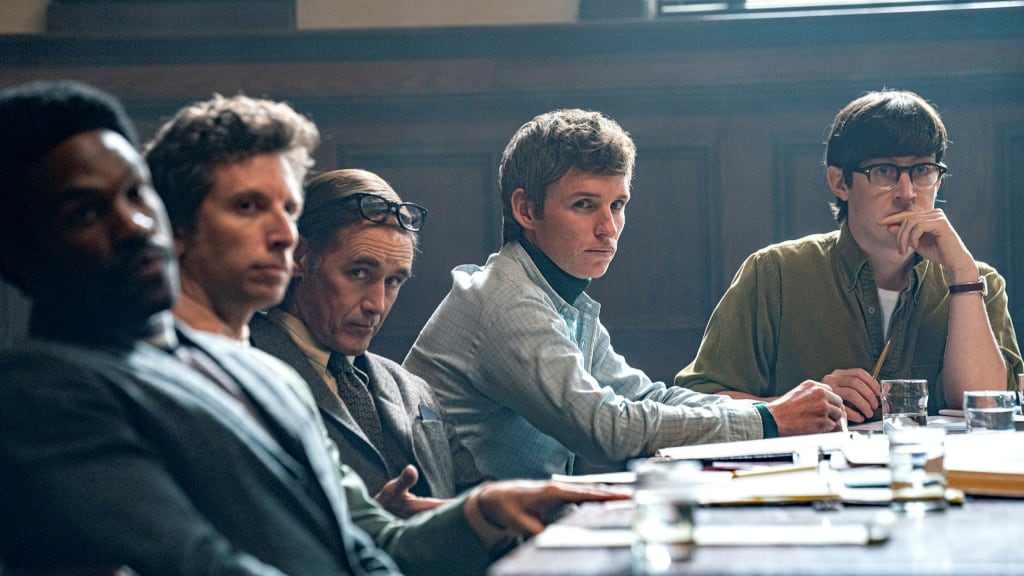
The Trial of the Chicago 7 has been in development for 12 years. Steven Speilberg originated the idea and recruited writer Aaron Sorkin to write a screenplay that would capture the chaos, turmoil and excitement behind one of the many so-called ‘Trial of the Century.’ In 1968 a group of Left Wing Activists were put on trial, accused of deliberately starting riots at the 1968 Democratic Convention in Chicago. The subsequent trial was a tyrannical farce that could be adapted into a dozen different movies. That Sorkin has distilled the trial to the most essential, and essentially entertaining elements makes the achievement of The Trial of the Chicago 7 so impressive.
After winning the 1968 Presidential election, a vindictive President-elect Richard Nixon decided he would settle scores with those who had opposed his campaign and, especially, those that opposed the war in Vietnam, a war he was not about to bring an end to. At the Justice Department, with his new Attorney General confirmed, Nixon instructed John Mitchell to find a way to prosecute the activists who had battled Police in Chicago in protest of the Vietnam War.
Tasked with coming up with charges that might stick was a young prosecutor named Richard Schultz. (Joseph Gordon Levitt). Though he felt the prosecution wasn’t well motivated, Schultz accepted the case and set about prosecuting the so-called Chicago 7 on dubious charges that they had conspired to cross state lines with the intent of starting a riot. This would not be an easy charge to make stick under normal circumstances but it was made more difficult by the fact the various members of the Chicago 7 had hardly met before going to Chicago, let alone conspired together.
The Chicago 7 were made up of several distinct leftist groups. Tom Hayden (Eddie Redmayne) and Rennie Davis (Alex Sharp) were part of The Mobe, a group mobilizing young people to end the war. Abbie Hoffman and Jerry Rubin were known as the Yippies, a group who became famous for protest pranks as much as for actual protests. David Dellinger (John Caroll Lynch) was a writer for a Marxist magazine known for promoting non-violent activism as modelled by Mahatma Ghandi.
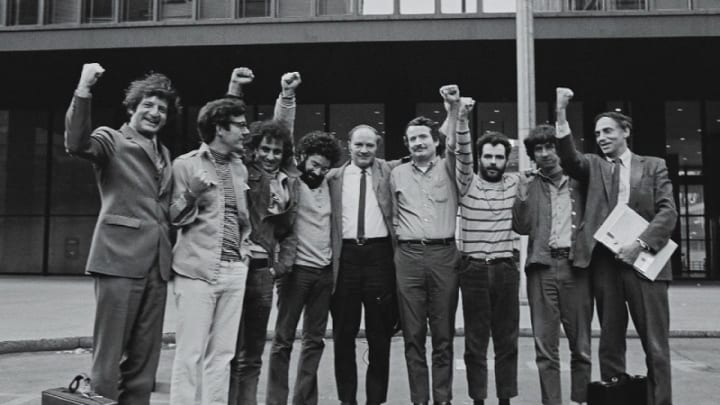
Despite being the same side, the groups were all from different states and different perspectives. The final two members of what would be the Chicago 7, John Froines and Lee Weiner, were academics, professors who’d spoken and written against the war. Hoffman theorized, quite correctly, that Froines and Weiner had been thrown into the prosecution to give the jury two people they could acquit and feel less guilty about convicting the other 5 on such flimsy charges.
They were called The Chicago 7 but there was an 8th defendant in the courtroom. Black Panther leader Bobby Seale (Yahya Abdul-Mattee) was also on trial. Seale is the lynchpin of the drama in The Trial of the Chicago 7. Denied a lawyer, Seale was subjected to stark and shocking racism by the trial judge, Julius Hofffman (Frank Langella) throughout the trial. Seale’s lawyer suffered a heart attack and was hospitalized before the trial. Seale requested to have his trial delayed until his lawyer could represent him and he was denied. Seale requested to represent himself and was told that he could not.
Thus Seale could not mount any defense, object to any of the tactics used to characterize his involvement in the Chicago riots and was not allowed to present any evidence of his innocence. And yet, despite that, he was on trial and possibly subject to jail time if found guilty, which he most assuredly would have been had it not been for a series of catastrophic events, blatantly racist decisions by Judge Hoffman that mark the biggest dramatic moments in the movie.
Frank Langella delivers one of the best performances of his storied career. Langella’s take on the corrupt, racist, borderline senile Judge Hoffman looms over the movie. Hoffman’s antics at trial almost assured that the Chicago 7 would be found guilty, that was his aim. And yet, he would also ultimately be responsible for the success of the eventual appeal filed by famed lawyer William Kunstler (Mark Rylance).
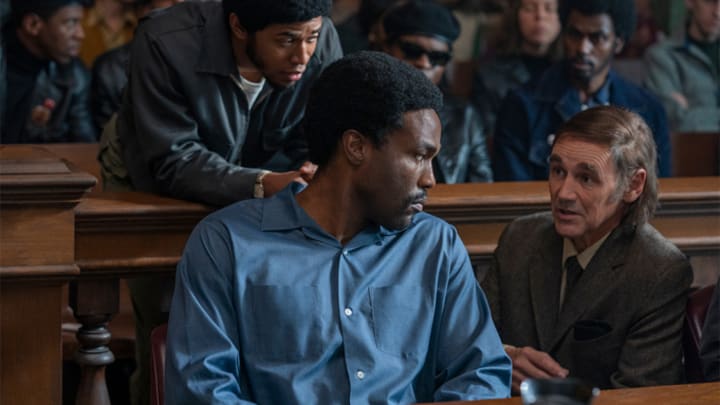
Equally as good as Langella is Mark Rylance as William Kunstler who represented the Chicago 7. Rylance shines in the best scene in the entire film. A night before Tom Hayden was to testify a tape emerged in which Hayden is heard to say something that could have been interpreted as starting the riot. Hayden disagrees and the two verbally spar over whether Hayden could really defend himself on the stand. It’s a superb scene that crackles thanks to Aaron Sorkin’s crisp dialogue and Rylance’s laser focused performance.
The Trial of the Chicago Seven is not a flawless masterpiece. At times, Aaron Sorkin’s quirky dialogue and showy style choices overwhelm what is already a powerful story on its own. Sorkin can’t help injecting his humor into the movie even when his verbal asides stop scenes dead or distract from what is important about the scene. The dialogue is still witty because Sorkin is a very smart writer but The Trial of the Chicago 7 could be tighter and more focused without Sorkin’s asides.
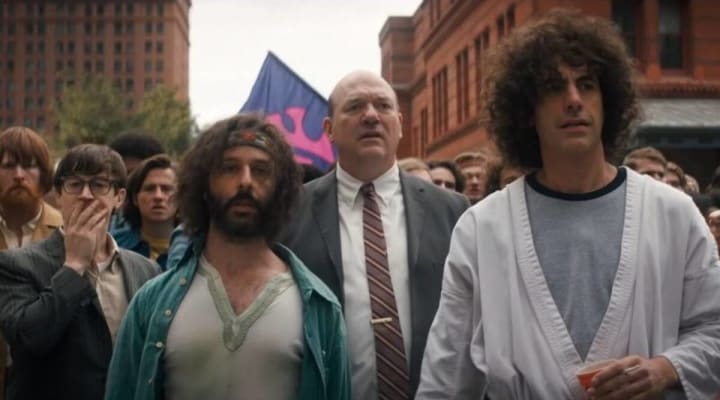
That said, I really did enjoy The Trial of the Chicago 7. The story feels as timely and relevant today as it did in 1968. With activists being targeted today in places such as Portland, we appear on the verge of another Chicago 7 sometime in the near future. Let's say, perhaps, Donald Trump were re-elected and felt emboldened to go after enemies with the same vindictive fervor that drove Richard Nixon a trial like the one we saw in 1968 doesn't seem all that far-fetched and thus The Trial of the Chicago 7 is instructive as well as entertaining.
About the Creator
Sean Patrick
Hello, my name is Sean Patrick He/Him, and I am a film critic and podcast host for the I Hate Critics Movie Review Podcast I am a voting member of the Critics Choice Association, the group behind the annual Critics Choice Awards.



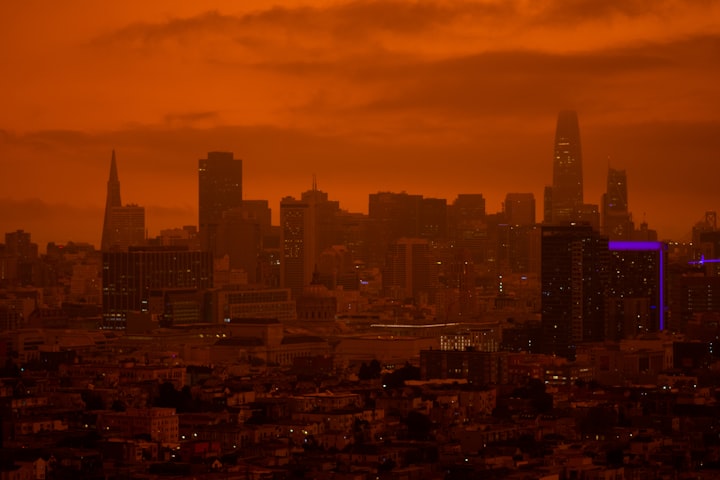


Comments
There are no comments for this story
Be the first to respond and start the conversation.